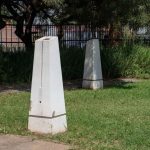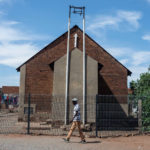Is June 16 just another binge-worthy holiday for many?
With Youth Day looming, Kliptown residents reflect how the meaning of the day has degenerated, and how broken promises and alcohol have blunted South Africans’ sense of the future.
Author:
13 June 2019

For Kliptown community activist Robert Shai, the youth are the future of the country, but he feels that they are out of touch with the meaning of Youth Day and what the holiday truly means.
“Our youth is more into alcohol, every holiday for them means alcohol. June 16 means alcohol, it was Easter just now … and, left and right, children are getting drunk,” he complains.
Shai says the youth no longer respect tragic moments in history, including public holidays which came about as a result of commemorating those lost during the struggle.
“I remember, during June 16, we didn’t get drunk … It was about changing the system from the status quo [that says] that we must learn Afrikaans by force.
“Afrikaans wasn’t our language, we couldn’t understand Afrikaans, we were forced to learn Afrikaans and if you are forced to learn Afrikaans, what about your own language? What about your own dignity? What about your culture? What about selfness?” he asks.

Kliptown promises unkept
Despite the numerous sweeping declarations proclaimed in the Freedom Charter, the daily lived experiences of many people in Kliptown, Soweto, is galaxies away from those declarations.
The mood was festive during elections in the historic area, with most residents either pledging their allegiance to the ruling party or vowing not to vote while they are “using EasiLoo and living in such an environment”.
StatsSA’s quarterly statistics showed that there was a 0.5% increase in the unemployment rate, with unemployment figures jumping to 27.6% from 27.1% in the last quarter. Youth unemployment sits at 52.8% and the figure is likely to increase.
“People need jobs! I think the very jobs we are crying about can stop a lot of things, like crime. If I work and know that I am earning … I won’t think ‘let me sneak in that house because the elders aren’t there’ … if I see you carrying a camera, I won’t immediately see money,” Shai argues.
Related article:
While acting as a chaperone around the waste-filled township, Shai walks into an altercation between a few teenage boys fighting about stolen phones and a missing R300. A woman shouts, “Are you also causing trouble? I want to hit you, I want to hit you. What did you do?” she asks angrily. “You would not be shaking like that if you didn’t do anything,” she accuses them, while the other boys downplay their anger at their fellow and shield him of any wrongdoing.
Shai says theft would not happen if the youth had decent education prospects.
A group of Stokvel members, clad in black, drink freely and happily while singing songs of praise, covering the township by taking shortcuts through dusty passages. Their songs carry them past the illegally dumped rubbish that includes used nappies, egg shells, crusts of pap and cut grass.

Fractured family relations
A rutted dirt track branches off the main road. A number of furrows snake down this winding walkway, flanked on either side by decaying houses. The track eventually branches out from the street to a stream that rolls down from the Klipspruit river. Because the rains have subsided, soaring reeds can be seen scattered in a clump near knee-high grass. Right on the river bank lives Dan Phomodi, 60, a traditional healer.
Phomodi has two sons aged 40 and 32. Shaking his head sheepishly he explains that he has an estranged relationship with his oldest son and partly blames himself for his son’s downfall. His firstborn is addicted to nyaope and Phomodi believes that is because he had no access to opportunities.
Phomodi has spent most of his life in Kliptown and lives with his grandson Katiso, who is 13. The boy has not seen his father in over six months.
“He steals this young boy’s phones when he comes here and sells them, so we cannot have someone like that around. I will educate him,” shrugs Phomodi.
Katiso was taught how to ride a horse in the open green fields right next to the rubbish and portable toilets. He’s as broody as the horse he commands so well and effortlessly. The children look on, making clicking sounds and playfully calling Katiso so they can see him make the horses gallop in the clearing before screaming and laughing while running away.
Phomodi warns that if those who are less fortunate are not given access to opportunities, crime will continue to grow because a few will be exposed to education while others are exposed to a life where crime and drugs are a norm.
“What about these guys? They will grow up to steal from those who graduate,” he says.

Leaving Kliptown the only way out
George Mohlala, 36, says one has to leave Kliptown in order to get decent work prospects. Mohlala feels that no one is ready to govern yet, adding that the ruling party has a lot to achieve.
“They have done a lot for us. [The ANC] has failed in a few places, but it doesn’t mean it has failed dramatically. I see the future but the mandate for the ANC has not been fulfilled.
“We don’t have schools, libraries, clinics, free wifi. If you want to be something, you have to leave Kliptown. The youth is ignored,” he says.
Mohlala says three presidents have passed and nothing has changed in Kliptown. Despite this, he continues to vote because he says he knows many people died in order for him to have the privilege of voting, a right previously denied to black people.
Mohlala hopes Cyril Ramaphosa will bring changes to Kliptown because he is from Ciawela, which is just a stone’s throw away. “He used to sell coal with his father here in Kliptown so we are just hoping but truly speaking … the whole community is not happy,” he says.

Government neglect continues
The Gauteng Provincial government and the City of Johannesburg were due to jointly give more than R375 million towards the renovation of Kliptown, the city’s oldest all-race settlement, in an effort to make Gauteng a smart province.
Kliptown was supposed to be the first town to benefit from the Johannesburg Development Agency, through which the money for the project was due to be channelled, but it has not taken off.
Kliptown has suffered years of neglect and the dazzling exception that is Walter Sisulu Square only exacerbates the squalor revealed when the eye follows the black power lines across the street and the railway tracks and into the township.
Related article:
The church where the historic charter was signed was renovated in January, and upgraded from a brown brick façade to an impressive grey-and-navy building. Shai says the main issue still remains a lack of housing.
“You cannot remove me from a shack and put me in a shack again and add electricity … The bridge is almost done and people didn’t want a bridge, they wanted houses,” Shai says.
The bridge was previously there but has been renovated because it is prone to flooding. It connects to Klipspruit West and Ciawela, with Fouche Road leading to Lenasia.
There is no water-borne sewerage in Kliptown and some houses still use the bucket system.
Shai says Kliptown needs a proper drainage system to handle the water from different places, including the Soweto Hotel on Freedom Square.
Cynical political visits
He adds that he was not excited to vote because he feels like it’s just like making someone rich. “After you have cast your vote, they won’t be coming back for the campaign, you won’t be seeing them anymore,” he says.
“The freedom that I have and the right, in hoping that maybe there can be change, also it’s like gambling because you are not sure whether you are going to win or lose, whether what you wish is going to be there,” he says.
Just before Easter, Shai recalls that ANC secretary-general Ace Magashule was in Kliptown for door-to-door canvassing. “How can you come into this community with [BMW] M5 sports, what must a person think?” he asks.
For his part, Phomodi says he cannot blame politicians for anything because he knows that politicians have the right to lie.
“How can you steal from people and ask for votes?” Phomodi asks, admitting that he voted.
Magdeline Moatshe, 47, lives in the former house of struggle stalwart Charlotte Maxeke. The blue plaque declaring her house as a City of Joburg heritage site has been damaged, the words hardly recognisable. “A group of drunk boys threw a brick here during the 16 December holidays,” she explains. The plaque has still not been fixed.
A day before the elections, Moatshe transformed the house into a time portal reaching back to the 1980s. She was dancing to the tunes of Sarafina! to “remind myself of those times” while her visitor ate pap and gravy. Moatshe was adamant that she was giving the ruling party one last chance to work for her.



